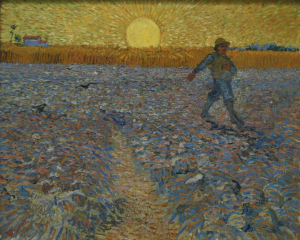HOMILY WEEK 03 03 – Year II
Stories of Unconditional Love:
(2 Sam 7:1-17; Ps 89; Mk 4:1-20)
**********************************************************
Today’s liturgy offers us two stories of unconditional love to ponder: a covenant relationship, and the prodigality of God’s Word, both inviting us to be open to the Word of God and live it out in a covenant relationship of love.
The first reading and the psalm are all about God’s covenant relationship with David, and indirectly, with us through Jesus. When David expresses a desire to build God a house, God informs him through the prophet Nathan that it is just the opposite – God will build David into a house that shall last forever.
God has always wanted an intimate covenant relationship with God’s people, beginning with Adam and Eve (a couple), to Noah (a family), then Abraham (a tribe). With Moses, it involved a nation, a people set apart. The Mosaic covenant, however, was very conditional. Over and over in the Old Testament we hear, especially from Moses and Joshua, keep the covenant and you will be blessed; break the covenant and you will be cursed.
With David, God brought about a new covenant – one based on unconditional love. We hear it beginning in today’s readings: “The Lord will make you a house,” “I will establish his kingdom,” “I will not take my steadfast love from him,”: “your throne shall be established forever.” Psalm 89 affirms that covenant – almost line by line: “I have made a covenant with my chosen one,” “Forever I will keep my steadfast love for him, and my covenant with him will stand firm.”
Basically, God assured David no matter what he did, God would be with him. What did David do? Lust, adultery, arrange a murder – rather serious matters. However, when confronted by the prophet Nathan, David repented and experienced God’s unconditional love as forgiveness. That experience of forgiveness and unconditional love transformed David into the only true King Israel ever had. Not only that, David prefigured the new and eternal covenant in Jesus Christ, which explains why Jesus is always referred to as Son of David, of the City and lineage of David, and never Son of Moses or Elijah. And now, that eternal covenant established by Jesus Christ and his death on the Cross, is ours to live out and enjoy. Oh, happy fault!
 Turning to the gospel, we hear the familiar parable of the sower. What is striking is the prodigality of the sower. Given the high cost of seed, no farmer or gardener would ever broadcast seed indiscriminately over less than well prepared soil, but this sower, God, does. God pours out God’s love and God’s word over everyone, regardless of the reception.
Turning to the gospel, we hear the familiar parable of the sower. What is striking is the prodigality of the sower. Given the high cost of seed, no farmer or gardener would ever broadcast seed indiscriminately over less than well prepared soil, but this sower, God, does. God pours out God’s love and God’s word over everyone, regardless of the reception.
With that love poured out over us, we are given a choice in the parable: be the path that does not respond at all to the Word (like a mafia boss attending the baptism of a grandchild while his orders to commit crime are being carried out); be rocky ground which hardly gives the word a chance (like someone who attends a Cursillo, is on fire for a week, then goes back to what he or she was before); be weed-infested ground that slowly kills the new plant (like many good people just too caught up in every-day activities to make religion a priority), or good soil that balances prayer, leisure, relationships and work, and seeks always to do the will of God every day.
Author James Martin, in his book Jesus – the Pilgrim, recounts how he believes he accidently discovered the Bay of Parables in the Holy Land, where Jesus might have delivered this parable from a boat. He was excited about this discovery because he could see before his eyes the very path, rocky ground, weed-infested ground and good soil that Jesus might have been talking about.
The Eucharist is an experience of God’s unconditional love for us, and a participation in the new covenant God offers to us through the body and blood of his Son, Jesus, Son of David. The liturgy of the Word offers us daily an opportunity to be good soil and to take to heart God’s Word.
May our celebration today help us become good soil for God’s Word, and live out our covenant relationship with God by loving all those in our lives unconditionally.




Well, it is a grateful and beautiful reflections and stories related to unconditional love. We should be living this New Covenant while Jesus is present on this earth and teaching us how to love unconditionally. We should take a moment to reflect on the word of God through prayer , meditation and pondering over scriptures . We should have a time for prayers during the day besides work, leisures and relationships . When we celebrate his life and receiving the communion is taking part of this Covenant and to live out this relationship with God. We are to love others unconditionally by comforting them and support people in need. Amen. Thanks be to God.
I agree with your stories and reflections about the Cursillo and balancing prayer and religion with work, leisures, entertainments and relationship . I see many people who tends to neglect religion with their busy schedules . They forget to pray and they do not have a private moment for the Lord God. Thanks Bishop Sylvain Lavoie . May God Bless you . ??????❤️❤️???